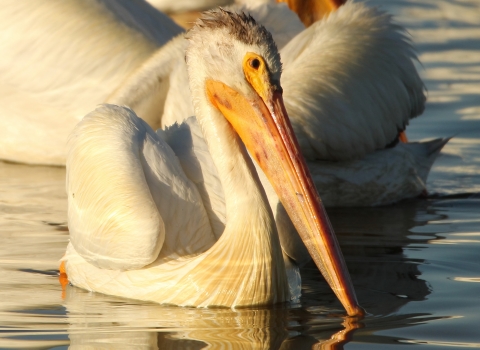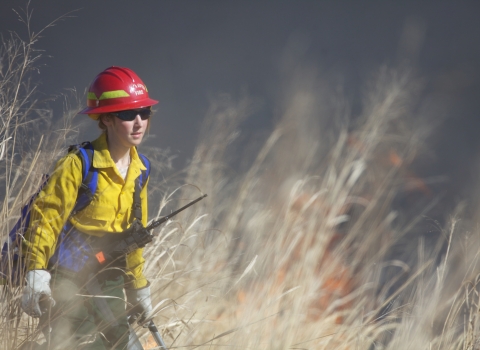From artificial intelligence to spot illegal online sales of freshwater turtles, to harnessing solar energy to reduce marine bycatch in illuminated gillnets, the U.S. Fish and Wildlife Service and its Theodore Roosevelt Genius Prize winners are reaching beyond the traditional conservation community to foster technology-driven solutions that can solve conservation challenges. The most recent prize-winning innovations were selected from three of the six 2023 competition categories: preventing wildlife poaching and trafficking, promoting wildlife conservation, and protecting endangered species.
The five winners will receive $100,000 each for their innovations, while two additional entries will receive non-monetary honorable mentions.
“Today’s conservation challenges are complex and numerous, including climate change climate change
Climate change includes both global warming driven by human-induced emissions of greenhouse gases and the resulting large-scale shifts in weather patterns. Though there have been previous periods of climatic change, since the mid-20th century humans have had an unprecedented impact on Earth's climate system and caused change on a global scale.
Learn more about climate change , loss of species and habitat, new invasive species invasive species
An invasive species is any plant or animal that has spread or been introduced into a new area where they are, or could, cause harm to the environment, economy, or human, animal, or plant health. Their unwelcome presence can destroy ecosystems and cost millions of dollars.
Learn more about invasive species and wildlife diseases, and the devastating impacts of wildlife poaching and trafficking,” said Service Director Martha Williams. “The Theodore Roosevelt Genuis Prizes and the diverse community of winning innovators exemplify how the Service is fostering innovation to deliver our mission to conserve wildlife and habitat into the future. These competitions support America the Beautiful initiative goals and work being done under the Bipartisan Infrastructure Law Bipartisan Infrastructure Law
The Bipartisan Infrastructure Law (BIL) is a once-in-a-generation investment in the nation’s infrastructure and economic competitiveness. We were directly appropriated $455 million over five years in BIL funds for programs related to the President’s America the Beautiful initiative.
Learn more about Bipartisan Infrastructure Law . Both efforts underscore the Biden-Harris administration’s all-of-government approach to bolstering climate resilience and protecting natural areas for current and future generations.”
The Theodore Roosevelt Genius Prize Competitions were established under the John D. Dingell Jr. Conservation, Management, and Recreation Act to award prizes and expand opportunities for new partnerships and networks to share ideas, catalyze new solutions, and spark conservation collaboration across the nation. The Service received 53 eligible submissions in response to the six prize competition categories.
The 2023 Theodore Roosevelt Genius Prize Competition category winners include
Preventing Wildlife Poaching and Trafficking:
- JJ Apodaca, Tangled Bank Conservation. This innovation intends to leverage information from genomic databases as a tool to streamline the processing, testing, and ultimate release of confiscated turtles. The idea could initially focus on the three most heavily trafficked turtle species in the United States -- the eastern box turtle, alligator snapping turtle, and Blanding’s turtle – to allow agencies to facilitate repatriation and release of confiscated turtles.
- Tim Mackey, S-3 Research. This innovation uses an automated artificial intelligence tool to identify and classify information on suspected turtle poaching and trafficking on the web. Information from these analyses could equip law enforcement agencies with valuable insights into trafficking patterns and aid the development of geographic heatmaps for poaching.
Promoting Wildlife Conservation:
- Mike Ellis, doctoral candidate, Tulane University. This innovation focuses on developing a science-based mobile game that would promote environmental literacy and engage broad audiences to expand awareness and understanding of the importance of conservation.
- Jesse Senko, assistant research professor, Arizona State University. This innovation uses a solar light that doubles as a buoy to reduce incidental capture (i.e., bycatch) of endangered large marine animals while maintaining target fish catch by illuminating gillnets. This innovation would integrate the lighted buoy into existing fishing gear, decreasing the cost for fishermen while benefitting marine animals. The illuminated buoys would remain illuminated for approximately one week without sunlight and last several years without changing batteries.
Protecting Endangered Species:
- Joshua King, University of Central Florida. This innovation uses a non-toxic control system for fire ants that can protect ground-nesting wildlife species. The system uses a mobile trailer-based, hot-water mounted apparatus to control fire ant colonies without affecting nearby ground-nesting species. Wide implementation of this tool could increase survival of ground-nesting species by controlling fire ant colonies, preventing the insects from displacing adults and hatchlings of ground-nesting species.
Theodore Roosevelt Genius Prize Competition non-monetary Honorable Mention:
Protecting Endangered Species:
- Ravinder Arra, on behalf of Rishith and Arvith Arra. This innovation is an engineered design for a floating turtle egg protection platform that could help increase turtle and hatchling survival in some areas by decreasing predator threats.
Promoting Nonlethal Management of Human-Wildlife Conflict:
Sahra Mohamed. This is a conceptual program that incentivizes agroecosystems to reduce pesticide and fertilizer use through artificial intelligence monitoring by a mobile robot equipped with cameras and microphones. This level of monitoring has the potential to offer real-time insect monitoring by capturing visual and auditory inputs supporting a holistic understanding of insect distribution patterns.
The Service partnered with the National Fish and Wildlife Foundation to help administer the prize competitions and awards. The competition, which also sought ideas for managing invasive species, managing non-lethal human-wildlife conflict, and reducing human-predator conflict, was further guided by the Theodore Roosevelt Genius Prize Boards. These boards are responsible for selecting topics and issuing problem statements, and they work to advise the winners of any opportunities regarding development and implementation of their innovative solutions.
-FWS-
The U.S. Fish and Wildlife Service works with others to conserve, protect and enhance fish, wildlife, plants and their habitats for the continuing benefit of the American people. For more information, visit www.fws.gov and connect with us on social media: Facebook, Instagram, X (formerly known as Twitter), LinkedIn, Flickr and YouTube.



